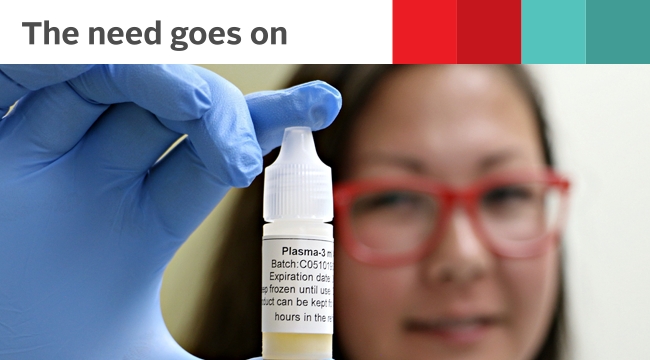Understanding the motivation behind plasma donation
Part of our ‘heroes of financial giving’ series
Even though one of every two Canadians is eligible to donate life essentials, such as blood, plasma and platelets, only one in 60 actually does. That means just four per cent of our country’s eligible population supports 100 per cent of the Canadians who require a lifesaving transfusion or transplant.
Each year, Canadian Blood Services must recruit 112,000 new donors to keep Canada’s biological lifeline going, so there is a critical need to explore new strategies and approaches to educate and inspire the next generation of donors.
To successfully meet this need, it is important to understand what motivates someone to roll up their sleeve to donate in the first place — or what deters them from doing so.
Enter Dr. Kelly Holloway. A medical sociologist by training, she joined Canadian Blood Services last year, thanks to the generous support of financial donors.
Read Adapt, Innovate & Overcome, our 2019-2020 report on the impact of financial giving.
Dr. Holloway is currently engaged in cutting-edge social science research that will lead to new, evidence-based strategies and approaches to plasma donor recruitment.
Her work is particularly timely as Canadian Blood Services is in the process of opening new plasma collection centres across the country, to meet rising demand. The first of three planned centres recently opened in Sudbury, Ont., with the other two in Lethbridge, Alta. and Kelowna, B.C. slated to open in the coming months.
Plasma donations essential to fight rare disease
Have you recovered from COVID-19? Consider donating plasma for clinical trials
Below, Dr. Holloway explains how applying a fresh, social science lens is critical to strengthening plasma collections and our national blood supply system and garnering better support for current and future patient needs.
Q: What attracted you to Canadian Blood Services?
A: I was attracted to Canadian Blood Services because it’s a non-profit organization dedicated to promoting public health. Since joining the organization, I’ve been impressed with our ability to lead research and our commitment to ensuring that the work we do is informed by evidence. Canadian Blood Services has made very important contributions to clinical and biomedical science, and there’s a real opportunity for us to be a leader in social science research as well.
Canadian Blood Services has just gone through a brand refresh, which highlighted Canada’s biological lifeline as a series of connections that link us all together — and that’s kind of how social scientists see the world. We view people as social beings who create meaning about who they are and the way the world works through relationships. I approach my research with attention to those interconnections: how the donor, the recipient, the staff and the volunteers — all of us, really — navigate changing social dynamics together.
Q: In your role as research associate, social science, you are trying to better understand what motivates people to donate plasma. Can you explain in a nutshell the objective of your work?
A: Plasma is the protein-rich, straw-coloured liquid in your blood that helps improve your immune system. Some have even described it as “liquid gold.” Plasma-derived products can be effective treatment options for patients with a wide variety of conditions, such as bleeding disorders, liver diseases and some types of cancer.
At Canadian Blood Services, plans are underway to increase plasma collection in our own country and bolster the domestic supply of plasma through three proof-of-concept sites, located in Sudbury, Ont., Lethbridge, Alta., and Kelowna, B.C. Right now, my research focuses on better understanding plasma donors and their motivations, so I’ll be going to those sites and speaking with donors, volunteers, clinic staff and other key informants.
My objectives include trying to understand what’s unique about plasma donors, how we can communicate effectively with them, how we can encourage people who have been donating whole blood to donate plasma and how we can retain plasma donors. By developing a better understanding of the donor’s experience and identifying the associated challenges, we’ll be able to better inform plasma recruitment in both the short and the longer term.
Q: Your study is still in the early stages, but is there anything that stands out from the research you’ve done so far that is unique to plasma donation?
A: Plasma donors are an interesting group. They seem to be motivated by the same kinds of things as other donors, in that they want to save lives and do something good. However, a lot of the newer social science research is saying that altruism isn’t enough of an explanation: that often, there’s more going on [in terms of why people donate].
Plasma donors seem to like the idea that the product they’re donating is special. They like knowing how it is being used for treatments and that there is a heightened demand for it. Being aware of these interests can help us promote plasma collection and build on the idea that donors are doing something very important and special. We’re examining strategies to promote that sense of pride that people get when they donate plasma.
Q: What impact do you ultimately hope your research findings will have on patients?
A: My broader mission is to help Canadian Blood Services gain a deeper, more nuanced understanding of plasma donors, so that we can continue to do the work of providing lifesaving products. For me, that means understanding donors in a social, political and economic context and understanding the various motivations — and deterrents – that exist for people in relation to the different ways of donating. Through my work, I hope to inform strategies to increase donations of plasma and other valuable blood products in Canada and make a meaningful contribution to the health of patients across the country.
Q: Financial donors interested in the areas of research and blood donation have provided support for your position. What does this support mean to you?
A: I feel an enormous amount of gratitude and respect for those who have made this work possible. Their generosity is what really inspires our faith in our ability to overcome the challenges that we are facing during this pandemic and to really thrive as an organization.
This interview has been edited for length.
Celebrating our heroes of financial giving and their lifesaving impactAt Canadian Blood Services, we need donors of all kinds to help support us in our quest to help every patient, match every need and serve every Canadian. Financial donors play an important role in strengthening Canada’s Lifeline, by helping us to grow and diversify our donor base and invest in cutting-edge research and technology that will help to meet ongoing and emerging patient needs. That’s why this November, we’re celebrating our heroes of financial giving. Financial supporters of Canadian Blood Services are generous individuals, organizations and partners from across the country who hold fundraisers, make monthly or annual financial contributions, invest in innovative research or honour their loved ones by helping to support patients. In celebration of National Philanthropy Day (Nov.15), we’re publishing a series of stories all month long, which profiles our growing community of financial supporters and recognizes how their generosity is helping us to catalyze meaningful change for patients and their families. Read our latest annual report to financial donors to learn more about the impact of financial gifts made in support of Canadian Blood Services. |



